Summary 
Exceptional world premiere comedy depicts Comedy of Errors as a wartime movie project being filmed in Shepperton Studios by a group of frantic English artists during the London blitz of 1940. The production triumphs on a variety of levels, with colorful Shakespeare scenes enhanced and framed by a period-piece 1930s screwball comedy. Wonderful entertainment, with memorably comic performances, stylish production values, and an uplifting theme.
Design
Directed by Barbara Gaines. Shepperton Studios Scenes written by Ron West. Set design by Neil Patel. Lights by Robert Wierzel. Costumes by Ana Kuzmanic. Sound by Lindsay Jones.
Cast
Ross Lehman (Dudley Marsh/Dromio of Syracuse), Nancy Voigts (Marian/Courtesan), William Dick (Charles Chittick/2nd Merchant), Kymberly Mellen (Veronica Marsh/Adriana), Timothy Edward Kane (Emerson Furbelow/Antipholus of Syracuse), Dale Benson (Ken/1st Merchant), Kevin Gudahl (Brian Hallifax/Dromio of Ephesus), Roger Mueller (Monty/Duke), Greg Vinkler (Admiral Philpot/Egeon), Paula Scrofano (Doris/Abbess), Sean Allan Krill (Phillip Sullivan/Antipholus of Ephesus), Angela Ingersoll (Alice Boggs/Luciana), Sean Fortunato (Eddie Philpot/Dr. Pinch).
Analysis
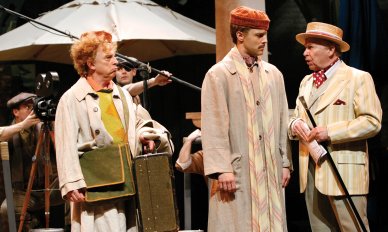
Ron West, a long-time Second City comedy-skit director in Chicago as well as book and lyrics writer for the cumbersomely-entitled musical comedy, The Second City's Romeo & Juliet Musical: The People vs. Friar Laurence, The Man Who Killed Romeo & Juliet, finds a natural partner in Barbara Gaines, founder of Chicago Shakespeare Theater. Gaines directs her usual veteran ensemble in Comedy of Errors but West provides an original outer framework, with more than a dozen freshly conceived characters struggling to shoot a film version of the play at Shepperton Studios in London at the 1940 height of the London Blitz. The mayhem and madness within Comedy of Errors is cleverly framed by West's mayhem and madness without, as the hapless film-makers struggle against an impossible deadline to create an inspiring work of art for the beleaguered English troops and panicked citizenry.
Gaines stages the play like a rapid-fire 1930s movie musical or screwball comedy, with overlapping machine-gun style bursts of dialogue from an expert ensemble.
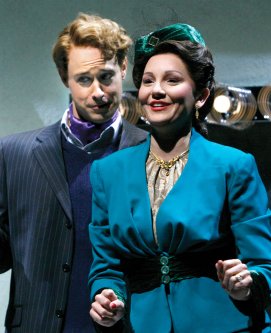
Set within the immense interior of the Shepperton soundstage, the production buzzes with a beehive of behind-the-scenes activity, performers and technicians and script girls and cameramen scurrying in every direction. West's motley crew of eccentric characters live in fear of a Luftwaffe blitzkrieg literally raining bombs down on their heads, and they move with the urgency of a thirty-six hour deadline. Almost everyone works on the Comedy of Errors film as well as has an acting role - the men apparently too old or for some reason unfit to be soldiers - with emphasis on national spirit. West's structure echoes the war-torn London of The Dresser and the behind-the-scenes frenzy of Noises Off, with weary and bag-eyed film director Dudley Marsh at its center. Ross Lehman expertly embodies Marsh with Noel Coward-like dignity and artistic decorum, but with a beleaguered body language and a droll sag-shouldered delivery. He copes for the good of his country with all the outrageous artists, the ridiculous deadline - even the affair his leading-lady and wife is having with a Clark Gable-like co-star - all amid the air raids that send his cast and crew scampering for cover and to the trap-door bomb shelter below.
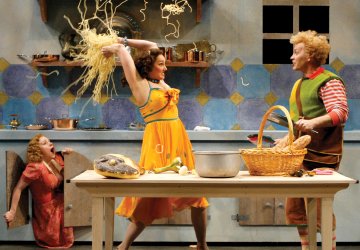
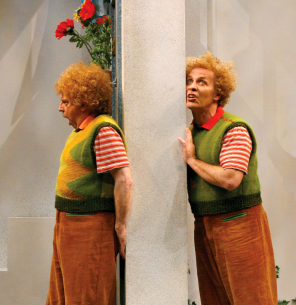
The frazzled Marsh's artistic nemesis - and in very funny counterpoints, his fellow Dromio within the staged-for-cinema effort - is a pompous veteran Shakespearean stage actor disenchanted with Comedy of Errors, the insult of being relegated to a supporting slapstick role, and the whole concept of filming during a bombing blitz. Kevin Gudahl plays Lord Brian Hallifax as a stuffy and arrogant version of a younger John Gielgud - with a comically chronic case of halitosis - turning his nose up at the efforts around him and trying desperately to insert Henry V's stirring St. Crispin's Day rallying speech into his arm-chair drone documentary-style introduction to the film. Marsh and Hallifax wage temperamental artistic battle for control of the film and the play, and when they don their Dromio costumes - wild orange curly-haired wigs, red and white striped short-sleeved shirts, green vests, ginger-colored flood pants - the two serious artists delightfully look as ridiculous as their arguments sound.
Gaines' splendid staging captures the look and feel of the era with period hairstyles, wartime rationing and propaganda posters on walls, and an abundance of late 1930s songs and cinematic-style background strings. The soundstage teems with lighting standards, old-time reel cameras, cables and wires dragged across the floor, and brightly lit small set pieces for the movie. The World War Two timeframe is wrought with realistic costuming - subdued and natural-looking for the crew, colorful and more flamboyant for the stars - as well as with spectacular special stage effects. As Luftwaffe bombs shake and rattle the set, exploding in showers of sparks, rolls of smoke pour onstage and part of the set roof collapses as the artists shout and flee.
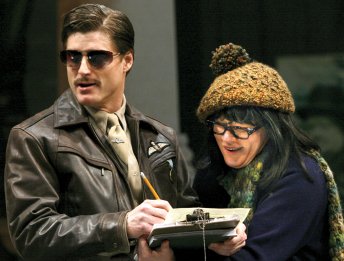
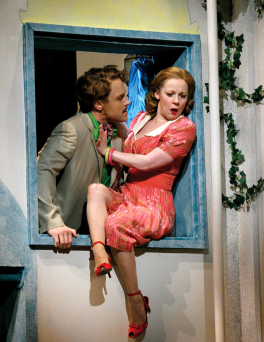
Gaines fully captures the color and character of West's array of supporting roles: Veronica Marsh is a well-spoken, oh-so-bored Vivien Leigh type - with a touch of Greer Garson - posing and pretending ennui until lapsing into bouts of groping passion with a co-star; her lover, the wonderfully named Emerson Furbelow, is a blowhard in a Clark Gable mustache and squint, wearing vest and neckerchief and decrying his typecasting in swashbuckler roles to the point he refuses to carry a sword as one of the Antipholi; and a sexy young ingénue named Angela Ingersoll in her flattering red dress and strappy red high heels threatens to disrupt the entire production with just her lissome presence. A visiting Admiral, played with starched stiffness in a pristine white uniform with big brass buttons, visits and assesses the goings-on like an inspector from a modern Homeland Security office. He complicates matters even further by delivering Eddie Philpot, his flatulent nephew with an old-time music hall vaudevillian background and a campy, more-than-half-crazed demeanor. The standout among the smaller roles is Sean Alan Krill as a Frank Sinatra-like Yank, an ace fighter pilot named Philip Sullivan on loan to the Royal Air Force and a Hollywood box-office superstar and singer in turn on loan to Marsh's production company. With his aviator sunglasses, brown leather bomber jacket, and suave style, he doesn't mesh well with the hyper-artistic Brits, and when he has trouble memorizing some of his Antipholus lines, the film project seems to teeter upon doom. But of course Marsh and Sullivan come through - leading them all in overcoming the obstacles and in-fighting - with Sullivan showing his superstar chops, even singing a couple of quick and breezy songs within the movie, and Marsh's final film turns out to be a brilliant achievement.
West's framing script, with its snappy 1930s dialogue and lively characters, effectively complements the fractured stage version of Comedy of Errors, and Gaines' intelligent and sophisticated production adds elegance and thematic resonance to both. The subtle theme of the clever play-within-a-movie-within-a-play is a conceit that even in the most difficult times, spirit and understanding and peace matter above all - "brother and brother hand in hand, not one before the other" - which Gaines and West (and cast and crew) capture in a superbly conceived and imaginatively executed entertainment.